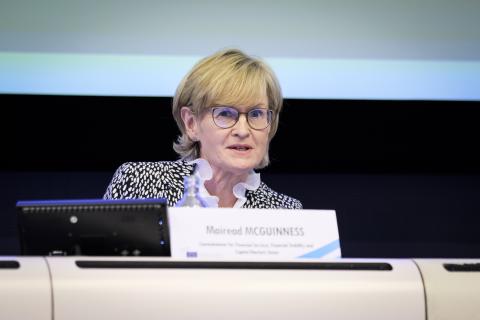European Economic
and Social Committee
EESC asks the European Commission to be more ambitious in efforts to steer the EU economy and finance toward sustainability
The EU is transitioning from a model driven by growth to one predicated on sustainability, where the real level of well-being and development of our society is taken into account. A fundamental element of this systemic change is a greener, more sustainable and more digitalised European economic and financial system. At a plenary session on 8 December 2021, the European Economic and Social Committee (EESC) held a debate with European Commissioner McGuinness on how to achieve this.
EESC President, Christa Schweng said: The Commission proposals are going in the right direction but a great deal still has to be done, and we hope that our proposals from organised civil society will feed into discussions on, and help shape, effective frameworks. The policy fields we have discussed clearly entail high European added value. Only with European action, coordination and harmonisation of rules can we put an end to the c
urrent piecemeal approach and improve efficacy.
The EU is stepping up its ambitions in sustainable finance, offering a supportive framework for all sectors and business sizes as they transition towards sustainability. It will help them reduce their negative impact on the environment, and become more resilient to climate risks, while enabling them to participate fully in the transformation of the economy
, said European Commissioner Mairead McGuinness.
The Plenary saw a number of opinions adopted, in an effort to help pave the way for a truly more sustainable EU.
Looking "beyond" GDP
In an own-initiative opinion, the EESC proposes that a series of new indicators be developed to complement GDP and help with the transition. A concise scoreboard should be designed and integrated into the European Green Deal and the EU economic governance framework. A set of indicators needs to be devised to track, monitor and evaluate the "greening" of financing, and existing indicators tracking climate change should be revised. The EESC also considers that the Member States should give priority to using some of the indicators proposed by the UN, but also act on the proposals set out by the OECD. It is essential too that the EC and the Member States support initiatives to measure well-being more effectively and analyse the impact of economic activities on the environment. Finally, society's perception of how the economic model is being changed should be tracked by further surveys.
Rapporteur Petru Sorin Dandea said: Investments in social cohesion, sustainable development, human and social capital and quality of life will be paramount for creating opportunities for modern businesses and for boosting employment, wealth and sustainable growth in the future. Indicators that look beyond GDP must be able to do more than merely monitor and measure; they must inform policy development, improve communication and promote target setting.
A more ambitious sustainable finance strategy
The EESC supports the goal to redirect investments, but thinks many of the measures proposed by the EC in its renewed sustainable finance strategy often appear hesitant and disregard the critical concept of social sustainability. It is urgent to take action. The strategy should also be designed and implemented hand-in-hand with the social partners and civil society, who need to be sufficiently represented in both the Platform on Sustainable Finance and the European Financial Reporting Advisory Group (EFRAG).
Unfortunately, the EU taxonomy doesn't embrace environmental and social goals in equal measure and leaves doubts about controversial economic activities. Moreover, it has to reflect a higher level of ambition than EU legislation, and success depends on its broad acceptance. The EESC recommends that sustainability factors should be carefully considered in financial sector risk management and rules on capital provisions. In these regards, the EESC proposes to revive the debate about an EU rating agency. Also very important is to put special attention on avoiding creating loopholes for Greenwashing.
Time is running out and the EC's strategy still often appears hesitant. A holistic approach is also needed, focusing on economic, environmental and social sustainability. The strategy will only deliver the desired steering effects in conjunction with an overall policy and regulatory framework geared towards sustainability,
said rapporteur Judith Vorbach. Co-rapporteur Jörg Freiherr Frank von Fürstenwerth added: "The framework will play a key role in the transition to a sustainable European economy. Sustainable finance should follow a multidimensional approach and we've made concrete suggestions for this. A greater involvement of social partners and civil society in the various fields of action would significantly advance the path to a sustainable economy."
EU green bonds as a "gold standard"
The EESC welcomes the idea of a new voluntary European Green Bond Standard that should help directing investors towards investments in projects that positively impact the environment. To avoid scaring off potential issuers of EU green bonds, the EESC also recommends a pragmatic approach to reporting and compliance procedures (avoiding over prescription and over regulation). There should also be at least some taxonomy alignment with third countries, otherwise the EC's proposed regulation is unlikely to become a standard for the global green bond market. Finally, the EESC suggests setting up a dedicated monitoring committee, involving the social partners, to supervise the dynamics of the green bond market.
An EU standard for green bonds is crucial to support the de-carbonization of economies. However, the EESC has doubts as to whether the private sector will opt for the adoption of a standard that is voluntary. Also, the EESC believes that the adoption of the standard ought to be extended beyond EU borders
, commented rapporteur Philip von Brockdorff.
Work organisation
Downloads
-
EESC asks the European Commission to be more ambitious in efforts to steer the EU economy and finance toward sustainability
